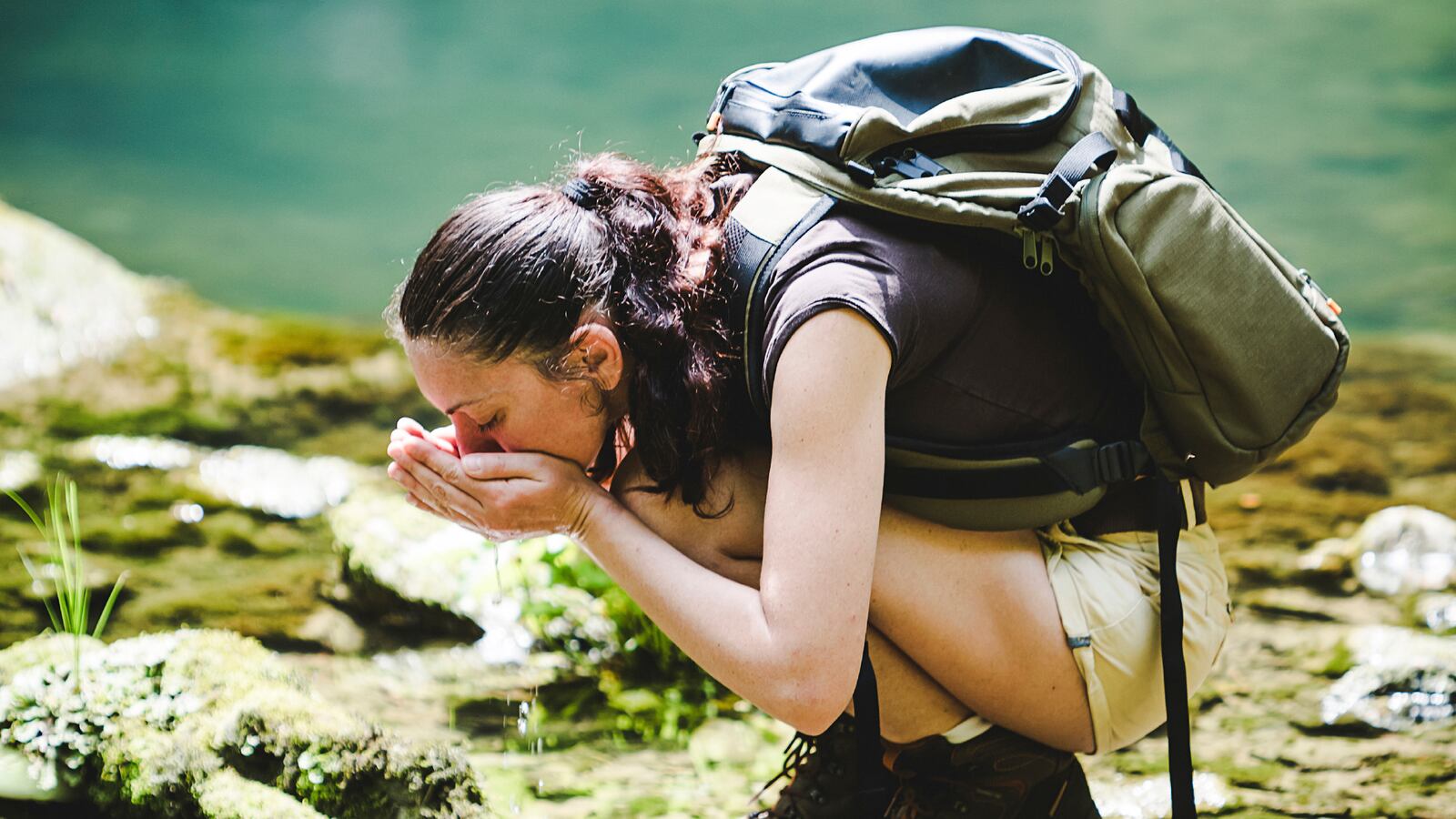Humans are a resilient species. We’ve managed to adapt to hellish conditions (have you been to Minnesota in the winter?) and thrive against all odds, dragging ourselves from caves to skyscrapers in a relatively short period of time.
Just this week, 72-year-old Ann Rodgers (and her dog!) survived nine days in Arizona’s wilderness, reportedly drinking creek water and eating plants. Rescuers found them thanks to a “HELP” sign Rodgers made out of sticks.
As we become more and more accustomed to lives of convenience and hardship starts to mean your phone is about to die rather than a scenario from that Oregon Trail video game.
But what happens if you head out into the woods to get that perfect Instagram photo, only to lose your way or, worse, break a limb and lose cell service? What if your hybrid runs out of both electricity and gas in the middle of nowhere, and you have to walk for help, and wind up roaming lost in the wilderness?
Accidents happen. Lucky for you, we’ve compiled a quick common sense guide to surviving in the wild.
First of all, forget what you’ve seen Bear Grylls do. Unless you’ve had some training, you definitely shouldn’t be taking unnecessary risks when you’re lost, alone, and out of contact with the world. Plus, if you follow some simple steps, chances are you’ll never have to squeeze water out of elephant poop.
The Golden Rule: Be Prepared
It’s that simple. Headed into Death Valley to check out the super bloom? Make sure you have a full tank of gas and plenty of water. Same with back country skiing. Warm clothes, extra layers, avalanche beacon, and plenty of water. Common sense is key. But say that the elephant dung does hit the fan? The times that you’re going to find yourself most exposed are when you’re taken by surprise, so the key is to be ready for a reasonable amount of anything.
Stuck in Your Car
Before this happens, get a backpack, throw some emergency stuff in it, and leave it in the trunk of your car. Several big bottles of water, a phone charger, lighter, candles, multi-tool, roadside flares, a jacket, small shovel, high-calorie trail bars that won’t expire for a long time, cash, and one of those silver reflective blankets that folds up into a tiny little square. Buy a basic first aid kit with bandages, antiseptic, various pills, and burn cream, throw that in there, too, along with a few day’s worth of any medication that you can’t miss.
If you’re stranded in a snowstorm, only run the engine for a few minutes every hour or so, as you want to make sure you don’t run out of gas. If your car broke down in the boonies, stay with it. If you walk away from it, make sure you stay close to line-of-sight, so you don’t get lost—you’re much safer with shelter than you are wandering the mountains.
Pro tip: A candle will keep the inside of an enclosed vehicle warm enough to survive in bitterly cold temps.
Lost in the Wild
First of all, if you’re going for a hike (even a short one, in a relatively remote area), always dress for the occasion and use proper planning. Have layers, water or a Steri-pen, some trail bars, a compass, lighter, sunscreen, a compact phone charger, and a multi-tool. If you aren’t familiar with the area, get a map—preferably a paper one, since electronics have a tendency to run out of batteries or break. You can usually find them free at rangers’ stations or trail heads. Get to know the type of terrain you’ll expect to be in, and check the weather. Also, learn how to recognize the North Star.
Since even the best-laid plans have a tendency to fall apart, here’s what to do if and when you find yourself lost in the wilderness.
Stay calm. Don’t freak out and run around screaming for help. You’re just going to get yourself more lost, and hyperventilating is going to use up a lot of energy. Sit down and think. Use your head, not your legs. If it’s safe and easy, go to a high spot and try to get a handle on where you are. Unless you see something familiar—a town or road—stay put. If you’re pretty confident that you know the way back, mark your path with piles of sticks or rocks so you know if you double back. Remember, it’s always better to go downhill than up. If you’re with someone, do not, under any circumstances, separate. You’ll eventually be noticed missing, and people will come looking for you.
Seek or make shelter. If it’s hot, stay in the shade if you can. If not, create a basic lean-to with branches. Pile fresh, green, leafy boughs to help keep wind and water off of you. Don’t make it too big—you want to be able to snuggle in and conserve body heat.
Build a fire. If you’re going to be out overnight, a fire will keep you warm and act as a signal. Gather as much wood as you think you’ll need to make it through the evening, put it in a pile, and then get four more piles of the same size. Now you may have enough for one night. Clear a space of any incendiary items like pine needles and dry leaves, and if you can make a ring of dirt or stones around your soon-to-be-blaze. Try to pick an area where it will be seen from far away, so it acts as a beacon, too. There are a number of ways to get a fire going without matches or a lighter, click here for a few, and learn at least two.
Pro tip: Once you get it going, keep your fire small, so as to save energy, fuel, and to maintain control. It’s a lot easier to survive in the forest than in a forest fire.
Signal location. Make noise by whistling, yelling, smashing things, whatever it takes. Adding pine needles, especially damp ones, to your fire will make a steady stream of thick white smoke. You can also pile rocks or sticks in a clearing in the shape of an “X” or in three large, equal piles—these are symbols of distress.
Water. You can only survive three or four days without water. If you find yourself running out, try to locate a nearby fast-running stream. The faster the water is moving, the less the sediment, and lower the potential of getting sick. But remember, drinking water like this can lead to all manner of unpleasant sicknesses, so if at all possible boil it over your fire for at least three minutes.
If there’s no fresh water and you’re on a hillside, walk downhill. If it’s an arid region, some cacti will yield drinkable water when broken open. You can try capturing dew overnight with broad leaves, or, in a real pinch, boil and drink your own urine. Remember, however, that every time you urinate and then take it back in, the amount of waste vs. the amount of water is increasing, and it becomes less and less safe to consume.
Food. You’ll make it two weeks without eating, so worry about water first. That said, being hungry sucks, and eventually you’re going to have to do something about it. Since you’re probably not skilled at making a snare for small animals, you can eat insects or embrace vegetarianism. For the bugs, look for crickets, cicadas, grasshoppers, worms, and grubs. Ideally, you’ll roast these in leaves by your fire to make the proteins more digestible and kill any bacteria, as well as lowering the yuck factor.
Smash the worms and grubs before cooking to get rid of the slimy poop. Remove heads, wings, barbed anything, antenna, and any hard plates. Avoid bright colors, bad smells, and anything furry. For plants, avoid anything with milky or colored sap, bitter or soapy taste, three-leaf growth patterns, spines, thorns, or hairs. Dandelions, clover, cattails, and kudzu. Follow the universal edibility test, and you should be okay.
Conclusion: Keeping a good attitude is important not only for your mental well being, but it also helps to boost the immune system, so do whatever you can to stay alert and positive. Try singing, or just make yourself laugh out loud—fake laughter will almost always lead to the real thing. If you encounter a curious, or worse, aggressive, predator such as a bear, cougar, or wolves, keep your distance, and don’t run. Play dead if a bear attacks. For canines or felines, make noise, throw rocks, use a club—displays of size and aggression will generally warn them away, but also don’t stare them down. If things go south, curl up into a ball, protect your face, and pray.
Good luck out there.






